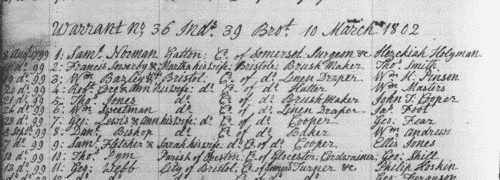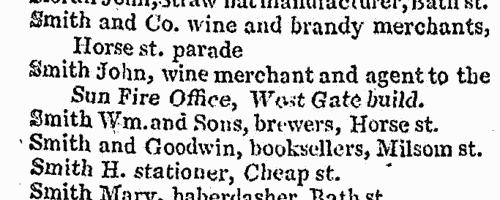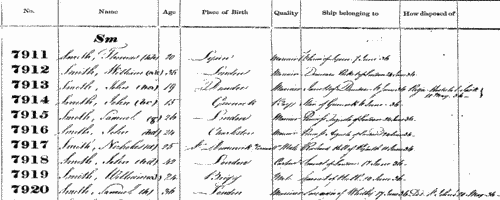Mccarty Surname Ancestry ResultsOur indexes 1000-1999 include entries for the spelling 'mccarty'. In the period you have requested, we have the following 96 records (displaying 31 to 40): Single Surname Subscription | | | Buying all 96 results of this search individually would cost £548.00. But you can have free access to all 96 records for a year, to view, to save and print, for £100. Save £448.00. More... |
These sample scans are from the original record. You will get scans of the full pages or articles where the surname you searched for has been found. Your web browser may prevent the sample windows from opening; in this case please change your browser settings to allow pop-up windows from this site.  Sailors on board H. M. S. Orion
(1796-1799) Sailors on board H. M. S. Orion
(1796-1799)
His Majesty's ship the Orion took part in the destruction of the French fleet in Aboukir Bay at the mouth of the Nile ('the Battle of the Nile') on the evening of the 1st and morning of the 2nd August 1798. This is the muster book for 12 October 1798 to 6 January 1799: being a continuation book in a series covering wages and victualling from April 1796, it also includes the names of some men who had died, deserted or been discharged from the ship from then to October 1798. Usually each man's entry gives his birthplace, and also his age on entering the ship.MCCARTY. Cost: £8.00.  | Sample scan, click to enlarge

|  Apprentices registered in Devon
(1801) Apprentices registered in Devon
(1801)
Apprenticeship indentures and clerks' articles were subject to a 6d or 12d per pound stamp duty: the registers of the payments usually give the master's trade, address, and occupation, and the apprentice's name, as well as details of the date and length of the apprenticeship. There are central registers for collections of the stamp duty in London, as well as returns from collectors in the provinces. These collectors generally received duty just from their own county, but sometimes from further afield. The indentures themselves can date from a year or two earlier than this return. (The sample entry shown on this scan is taken from a Bristol return. Each entry has two scans, the other being the facing page with the details of the indenture, length of service, and payment of duty.) IR 1/70MCCARTY. Cost: £8.00.  | Sample scan, click to enlarge

|  Apprentices and clerks
(1803) Apprentices and clerks
(1803)
Apprenticeship indentures and clerks' articles were subject to a 6d or 12d per pound stamp duty: the registers of the payments usually give the master's trade, address, and occupation, and the apprentice's name, as well as details of the date and length of the apprenticeship. 3 January to 31 December 1803. IR 1/39MCCARTY. Cost: £8.00.  | Sample scan, click to enlarge

| Inhabitants of Dublin
(1805)
Holden's Triennial Directory of 1805 to 1807 included a provincial section, listing professional people and traders in England, Wales, Scotland and Ireland. (The sample scan here is from the listing for Bath)MCCARTY. Cost: £6.00.  | Sample scan, click to enlarge

| Workers at Appleton's Spinning Mill, Manchester
(1818)
The minutes of evidence taken before the Lords Committee on the Cotton Factories Bill include a series of reports by medical men as to the general health of the mill workers in April 1818. For each factory there is a complete list of workers, giving full name, age, how long employed in a factory, health (in general terms, such as 'Good' or 'Sickly'), and any chronic disease or 'distortion', cause and duration - with slight variations from report to report. The physicians examined several hundred people each day, asking such questions as 'Have you any swellings or sores anywhere?', 'Are your limbs straight?', 'Have you a good appetite for food?', 'Do you conceive yourself to be in good health?', and all concluded that the health of the mill workers was good, and that the workers were cheerful. This is the report for Peter Appleton and Co.'s cotton spinning mill.MCCARTY. Cost: £6.00.  | Sample scan, click to enlarge

|  British merchant seamen
(1835-1836) British merchant seamen
(1835-1836)
At this period, the foreign trade of ships plying to and from the British isles involved about 150,000 men on 15,000 ships; and the coasting trade about a quarter as many more. A large proportion of the seamen on these ships were British subjects, and so liable to be pressed for service in the Royal Navy; but there was no general register by which to identify them, so in 1835 parliament passed a Merchant Seamen's Registration Bill. Under this act this large register of British seamen was compiled, based on ships' crew lists gathered in British and Irish ports, and passed up to the registry in London. Each seaman was assigned a number, and the names were arranged in the register by first two letters of the surname (our sample scan shows one of the pages for 'Sm'); in addition, an attempt was made to separate out namesakes by giving the first instance of a name (a), the second (b), and so on. But no effective method was devised to prevent the same man being registered twice as he appeared in a second crew list; moreover, the original crew lists were clearly difficult for the registry clerks to copy, and some of the surname spellings appear to be corrupted. A parliamentary committee decided that the system devised did not answer the original problem, and this register was abandoned after less than two years: but it is an apparently comprehensive source for British merchant seamen in 1835 to 1836. The register records the number assigned to each man; his name; age; birthplace; quality (master, captain, mate, 2nd mate, mariner, seaman, fisherman, cook, carpenter, boy &c.); and the name and home port of his ship, with the date of the crew list (usually at the end of a voyage). Most of the men recorded were born in the British Isles, but not all (for instance, Charleston and Stockholm appear in the sample scan). The final column 'How disposed of' is rarely used, and indicates those instances where a man died, was discharged, or deserted his ship during the voyage.MCCARTY. Cost: £8.00.  | Sample scan, click to enlarge

| Unclaimed Letters at Sydney General Post Office (1836)
'List of unclaimed letters remaining in the General Post Office, addressed to persons not known, or not to be found, and not previously advertised'. 23 February 1836. Full names, surname first.
MCCARTY. Cost: £6.00.  | Sample scan, click to enlarge

| Antigua Slave Owners (1838)
Slavery was abolished throughout the British Empire by act of Parliament in 1833. This list, published in 1838, gives details of compensation paid to owners who had suffered by the emancipation of their slaves after abolition. The table gives the date of the award, the number of the claim, the full name of the party to whom payment was awarded, the number of slaves, and the sum paid. Few masters had owned more than 100 slaves; most of the claimants had only a few. The cost of the loss of a single slave was generally assessed at about £13. There were 1076 claims from Antigua, including some that were abandoned, disallowed, or still unsettled because of litigation.
MCCARTY. Cost: £8.00.  | Sample scan, click to enlarge

|  London Policemen
(1830-1842) London Policemen
(1830-1842)
The Metropolitan Police Register of Joiners (MEPO 333/4) lists policemen joining the force through to 31 December 1842 (to warrant number 19892). The register is alphabetical, in so far as the recruits are listed chronologically grouped under first letter of surname. It is evidently a continuation of a similar earlier register, not closed until its alphabetical sections were filled: consequently, there are no entries in this register for the initial letters N, O, Q, U, V, X, Y or Z; and the sections of this register start at different dates - A 18 April 1840 (warrant number 16894); B 11 December 1830 (5570); C 7 September 1830 (4988); D 27 May 1833 (8445); E 15 December 1838 (14476); F 30 March 1832 (7372); G 1 December 1835 (11,184); H 25 April 1832 (7457); I and J 13 February 1837 (12449); K 2 January 1838 (13457); L 3 October 1834 (9905); M 15 November 1832 (7999); P 4 October 1831 (6869); R 4 September 1837 (13021); S 30 March 1835 (10366); T 6 April 1840 (16829); W 30 December 1833 (9096). The register gives Date of Appointment, Name, Number of Warrant, Cause of Removal from Force (resigned, dismissed, promoted or died), and Date of Removal. Although the register was closed for new entrants at the end of 1842, the details of removals were always recorded, some being twenty or more years later. Those recruits not formerly in the police, the army, or some government department, were required to provide (normally) at least two letters of recommendation from persons of standing, and details of these are entered on the facing pages: the names in these are indexed separately - this index refers only to the police constables. Where a recruit was only recently arrived in the metropolis, the names and addresses of the recommenders can be invaluable for tracing where he came from.MCCARTY. Cost: £8.00.  | Sample scan, click to enlarge

| Inhabitants of Birmingham
(1850)
Francis White & Co.'s History, Gazetteer, and Directory of Warwickshire for 1850 lists nobility, gentry, clergy, other private residents, farmers and traders, hundred by hundred and village by village, with separate sections for the large towns. This long alphabetical section lists inhabitants of Birmingham.MCCARTY. Cost: £4.00.  | Sample scan, click to enlarge

|
Research your ancestry, family history, genealogy and one-name study by direct access to original records and archives indexed by surname.
|













